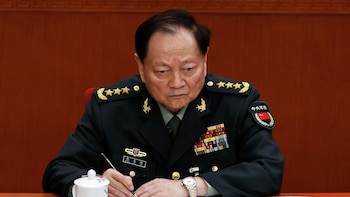
(ATR) We only know the barest of details about plans for the Olympic torch relay for the 2020 Games in Tokyo.
A slogan has been chosen. Special recognition to the earthquake region will be given. Many thousands of torchbearers will be chosen. The exact route is unknown.
Organizers say nearly all will be revealed next year.
It could be one of the longest in duration because Tokyo 2020 is proposing 130 days instead of the 100 requested by the IOC. Given the thousands of hamlets, villages, towns and cities across Japan, organizers face a complex task bringing the flame to as many people as possible. Every one of the 47 prefectures will be part of the relay.
In 1964, the relay for the first Olympics in Japan lasted just two months. In order to cover the country in that time, the flame was split into four. Each traveled to a different region before recombining into one flame the day of opening ceremony.
It seems unlikely that the number of runners will equal the 1964 relay. That one still holds the record, with an estimate of more than 100,000 torchbearers. The big number was due to large groups participating in single legs of the relay. For 2020, current standards say to expect the range of 10,000 to 15,000.
The 1964 flame’s journey from Greece where it was lit in ancient Olympia also is unlikely to be repeated. The aircraft carrying it stopped at 11 cities across Asia, with a small relay following in each city. Even Nepal got a taste of Olympic fever when the flame was split in New Delhi for a side trip to Kathmandu.
The IOC has sharply curtailed excursions of this kind in a bid to avoid complications and expense. In any case, Tokyo 2020 torch relay organizers are focused on keeping the event centered in Japan.
Who will pay for it all is another key question. Given the complexity and cost of traveling through Japan for more than four months, the sum will be large. Recent relays have cost upwards of $50 million. The hunt for two or three sponsors is underway. They likely will come from the ranks of Tokyo's biggest sponsors. Coca-Cola, for example, has sponsored the relay a number of times, including Nagano in 1998.
While the planning and logistics of a relay are enormous regardless of which country is involved, Japan has some experience with this event. Since the flame was first carried for the 1936 Olympics in Berlin, Tokyo 2020 will be Japan’s fourth relay. That is second only to the U.S., which has hosted five torch relays.
With the slogan "Hope Lights the Way", the flame’s journey promises to be as symbolic as the Tokyo 1964 relay. That event was designed as a message to the world of peace and a rebuilt Japan after the war.
This time the Olympic torch relay is meant to bring solidarity and support to regions of the country still recovering from the 2011 earthquake and tsunami.
Instead of Okinawa, where the relay has begun twice before in Japan, the initial plans for 2020 call for the flame to appear first in the Tohoku region. Later, the relay will spend three days in each of the three prefectures affected by the disaster -- Fukushima, Iwate and Miyagi.
The exact route, the design of the Olympic torch and cauldron, and other distinctive elements of this giant operation are among the many points that Tokyo 2020 will reveal over the next year or so.
But as the relay progresses through Japan in 2020, anticipation will build over one final question, maybe the biggest secret of any Olympic Games: Who will be the final torchbearer?
Figure skater Midori held the flame last for Nagano in 1998. For the 1972 Winter Games, Hideki Takada, a 16-year-old high school student in Sapporo had the honor.
Most symbolic so far may have been Yoshinori Sakai at the first Tokyo Olympics. A 19-year-old university student at the time, Sakai was selected as a "Hiroshima baby", because he was born nearby on August 6, 1945, the day the bomb was dropped. The official report from the 1964 Olympics says he was chosen "to symbolize peace and hope".
So the riddle remains for Japan and Tokyo 2020 until opening ceremony just over two years from now.
Who will be a symbol of peace and hope for Japan of the 21st Century?
A Japanese version of this story was published in Mainichi Shimbun on May 21. Read it here.
Written by Ed Hula
For general comments or questions,click here.
25 Years at #1: Your best source of news about the Olympics is AroundTheRings.com, for subscribers only.
Últimas Noticias
Utah’s Olympic venues an integral part of the equation as Salt Lake City seeks a Winter Games encore
Utah Olympic Legacy Foundation chief of sport development Luke Bodensteiner says there is a “real urgency to make this happen in 2030”. He discusses the mission of the non-profit organization, the legacy from the 2002 Winter Games and future ambitions.

IOC president tells Olympic Movement “we will again have safe and secure Olympic Games” in Beijing
Thomas Bach, in an open letter on Friday, also thanked stakeholders for their “unprecedented” efforts to make Tokyo 2020 a success despite the pandemic.

Boxing’s place in the Olympics remains in peril as IOC still unhappy with the state of AIBA’s reform efforts
The IOC says issues concerning governance, finance, and refereeing and judging must be sorted out to its satisfaction. AIBA says it’s confident that will happen and the federation will be reinstated.

IOC president details Olympic community efforts to get Afghans out of danger after Taliban return to power
Thomas Bach says the Afghanistan NOC remains under IOC recognition, noting that the current leadership was democratically elected in 2019. But he says the IOC will be monitoring what happens in the future. The story had been revealed on August 31 in an article by Miguel Hernandez in Around the Rings

North Korea suspended by IOC for failing to participate in Tokyo though its athletes could still take part in Beijing 2022
Playbooks for Beijing 2022 will ”most likely” be released in October, according to IOC President Thomas Bach.




